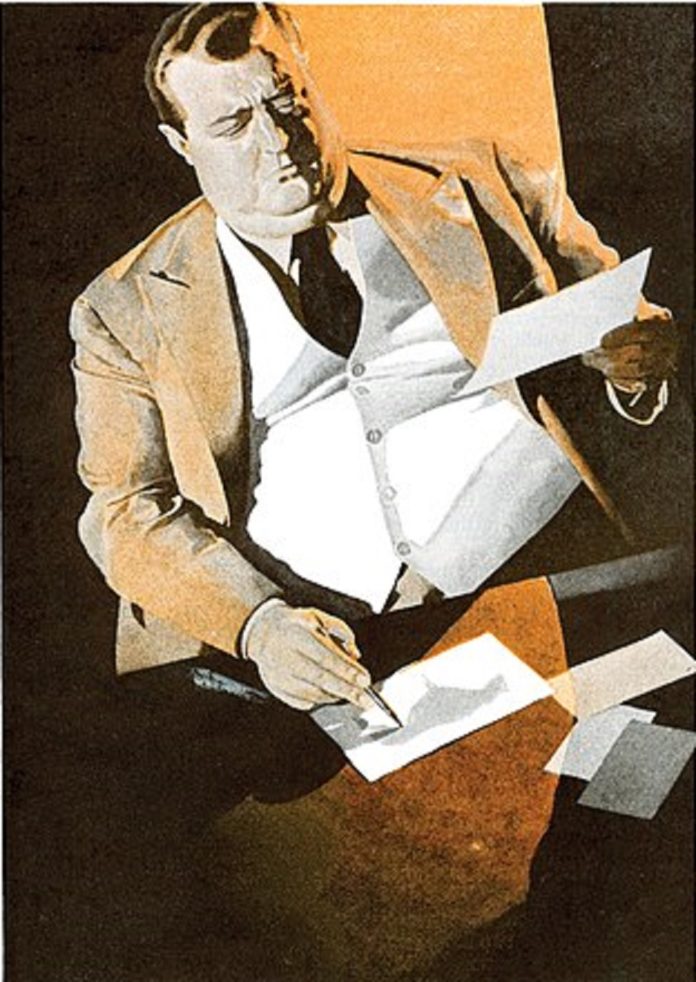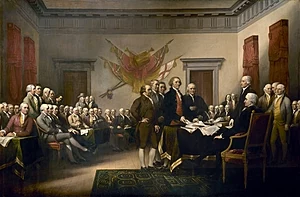My wife and I stumbled across a 2001-2002 drama series on one of our movie networks. It was called “Nero Wolfe” by Rex Stout, a product of the A&E Network. Stout wrote detective novels between 1934 and 1975, mostly being about this rich, corpulent, intellectual detective, and his leg-man, Archie Goodwin. They took a unique path to crime solving.
In most of those years Stout published his books exclusively through Viking Books.
Nero Wolfe films had been made before, but in the 2001-2002 series I’m citing here, Nero Wolfe was portrayed by Maury Chaykin and Archie Goodwin was played by Timothy Hutton. Much of the caste was played by a repertoire company playing various roles…all to great success.
Despite what you may think, Rex Stout was America’s best-selling mystery writer, but they did not start making films of his Nero Wolfe books until after he died in 1975. Stout didn’t need the money and I’m guessing that a lot of Rex Stout’s vanities and peccadilloes are wrapped up in Nero Wolfe’s character.
Nero Wolfe (played by Maury Chaykin) was a genius who sat behind his desk in his mansion in Manhattan solving crimes, letting his detectives to all the legwork, while he did the mind work from behind that desk. He had a lead detective/agent named Archie Goodwin (played by Timothy Hutton), with two or three additional legmen. Wolfe would simply bark out orders for the team to carry out and with very rigid, military-precision schedules. Wolfe was neither handsome nor pleasant to be around, but was extremely intellectual sounding. He tended to talk down to people, and was often curt. But as a genius, as you would expect, the police hated Nero Wolfe because he was always one step ahead of them, so he especially talked down his nose to cops.
And always from behind that desk.
Nero Wolfe had a household staff of one, a butler-chef named Fritz, and his office doubled as a library, where he sat and read, and held court when clients were in the room. His day was spent reading, and meeting with his chef, Fritz, where they planned the meals for the day. Archie Goodwin occupied a desk off to his right. Wolfe shut his office down from 9-to-11, for planning meals and again from 4-to-6, to adjourn to his rooftop garden where he cultured his orchids. He put away several half-liter bottles of fine beer in a tall German glass.
Now, in my opinion, I believe the Nero Wolf show lost favor with A&E, who owned it, very quickly, for it probably did not appeal to the sensibilities of senior management, and its Madison Avenue wing felt it wouldn’t have any kind of positive market effect on the growing new generation, Millennials, who would only be 19 and younger when the show premiered in 2001… lest we forget, just as the era of 9/11 would become a reality that would alter three generations’ understanding of American history.
By 2023 those Millennials would be in their 30s-early 40s, and might even find the series more to their liking were they to see it for the first time, but in 2001 Madison Avenue wanted little to do with it, despite it being in the top-four of television dramas. “Nero Wolfe” and a look back at 1940s Manhattan took America’s youth in a direction product marketers, and culture and idea marketers, in a direction you would immediately recognize, even in your 30s and 40s, should you want to see the series now. As one imdb.com writer wrote contemporaneously, when the series became a hit again on this second run:
After enjoying Nero Wolfe Season One and Two you’ll want more adaptations of Rex Stout’s Nero Wolfe done by Hutton et al. You’ll also wonder what fit of nincompoopery came over A&E and made them cancel this exemplary series.
As you know, I’m a big “law of generations” observer (as to why civilizations survive or die) and the necessity of a handshake extended by one generation about to pass onto the next generation. Rex Stout was trying to memorialize and pass on the zeitgeist of living in Manhattan in the pre-war years so that even kids today may have a better sense of what life was like then…things such as the rules of the road, the manners and customs of the times, extending what I’ve always referred to as a giant handshake between generations.
This is no small matter. And every generation in America, from its beginning, in accordance to the region, what I call “Sky Determines” rules, embraces those things that have gone on before.
This show was ground zero for the use of some very high-toned language, only, and here’s the grab, they are all words even average students would know and recognize and can pronounce with ease. Still, sounding pretentious, they are also words that are rarely used in certain kinds of company, so as a matter of good manners most of us do not use them to avoid making others feel uncomfortable or small.
These are not technical, scientific or philosophical terms, however, which carry a certain exclusivity associated with them. You will find these today in the nerdy tech-sector. Bill Gates, Steve Jobs, Jeff Bezos, Elon Musk, Jack Dorsey, are more “sorts” than “types”, all defined by inner workings, some admirable, others not so much we can not always decipher.
And they were not high-toned concepts. Even Nero Wolf’s appetites were understandable by the simplest of deductions.
Nero Wolf only used those kinds of big words in front of people he wished to be made to feel uneasy, especially rude, braggadocious police officers and office bureaucrats, and of course, college perfessers and Ivy League lawyers. And a few women; all grand dames.
It was a fun way to see killers caught without a single scuffle.
But the fact remains that the process of young kids aged 10 to 16, from Baby Boomers, onward, their learning via film came from their elders and it was the Baby Boomer generation that got full doses of a truly universal mechanism to pass the virtues and vices of a generation onto the next via popular culture. John Wayne broke into talkie films as a cowboy B-Western star in the 1930s, when his primary audiences kids aged 9-16, crowded into Saturday theater matinees. Those films got a Round Two in the early 1950s when they were packaged into Saturday television sessions, where sugared-cereal could be sold, before Hollywood could start filming their own TV shows for kids, shows like “Fury” and “My Friend Flicka” and “Rin Tin Tin”. Every kid show had a kid star, and an animal, but also an adult star-lead.
I was one of those kids. But vicariously, “Nero Wolf” allowed an entire generation to enter as well.
I can speak of these events firsthand, from 1953 or so, into color television around 1965. I can’t say when Hollywood dumped the adult role model, because I quit family-hour television for over a decade, but notice Hollywood had inserted teen-stars into John Wayne films in the 60s (e.g. Ricky Nelson). But throughout the 60s into the 70s, which would ease us into Generation X, (my sons’ era, 1965-1980), the children of the World War II generation would still be fed by those adult images, from John Wayne to Lee Marvin to Clint Eastwood.
That formula held through “Star Wars”..which is now into its third generation in my family, and later, the film versions of Tolkein’s “Lord of the Rings”. The Old West was no longer relevant, but the fundamental formula of Good vs Evil really hadn’t changed.
If he had done nothing more than to create Archie Goodwin, Rex Stout would deserve the gratitude of whatever assessors watch over the prosperity of American literature. For surely Archie is one of the folk heroes in which the modern American temper can see itself transfigured.—–Jacques Barzun
My wife loved this show, and I was impressed that we hate the same types of women in these episodes, and in the manner by which Nero Wolfe dispatched many high all-mighty women, who these days, I most often see with their sons after the first treatment of his transition to a Hilda, or her natural born Hilda’s 9th month abortion. (You know the type.)
There are too many generational moving parts for me to be able to put my finger on them here.
I just wish we had a television hero who would call a “spade an effing shovel” even if he has to say it in the Montenegrin vernacular and it meant the hand-shaking process would go on.





